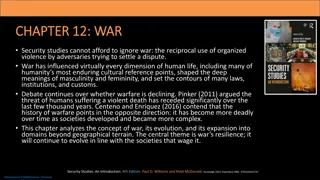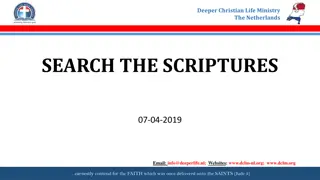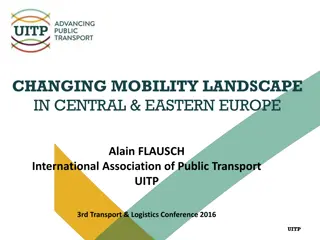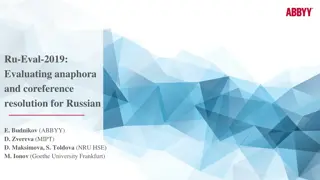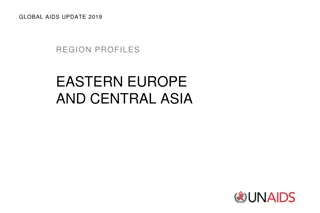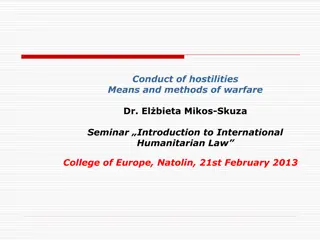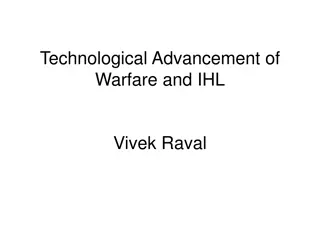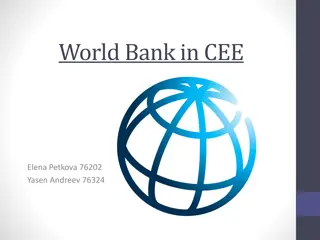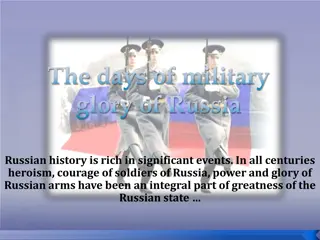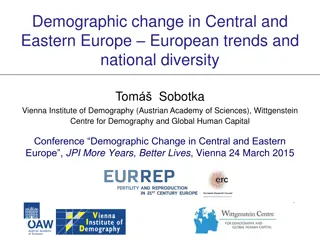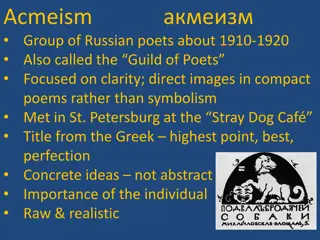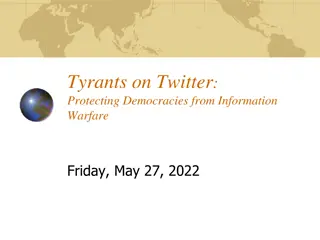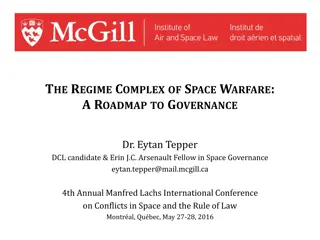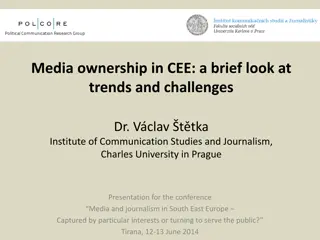Russian Economic Warfare in Central and Eastern Europe: Challenges and Impacts
Russia employs overt and covert economic warfare tactics in Central and Eastern Europe, including energy blockages and media manipulation. This strategy poses challenges to democratic values and institutions. The study examines the correlation between Russia's economic footprint and democratic standards, focusing on five case-study countries. The methodology assesses Russia's economic influence through key indicators. Insights from Central and Eastern European leaders and intelligence reports highlight the need for bipartisan policy solutions to counter Russian interference and protect democratic principles.
Download Presentation

Please find below an Image/Link to download the presentation.
The content on the website is provided AS IS for your information and personal use only. It may not be sold, licensed, or shared on other websites without obtaining consent from the author. Download presentation by click this link. If you encounter any issues during the download, it is possible that the publisher has removed the file from their server.
E N D
Presentation Transcript
STRATEGIC INSIGHTS & BIPARTISAN POLICY SOLUTIONS [Russia] uses overt and covert means of economic warfare, ranging from energy blockages and politically motivated investments to bribery and media manipulation in order to advance its interests and to challenge the transatlantic orientation of Central and Eastern Europe. June 2009 Open Letter to the Obama administration from Central and Eastern European Leaders
STRATEGIC INSIGHTS & BIPARTISAN POLICY SOLUTIONS The wind is blowing from the East... [it is possible] to construct a new state built on illiberal and national foundations [ ] July 2014 Prime Minister Viktor Orb n s Speech at the 25th B lv nyos Summer Free University and Student Camp
STRATEGIC INSIGHTS & BIPARTISAN POLICY SOLUTIONS The U.S. Intelligence Community is confident that the Russian Government directed the recent compromises of e-mails from US persons and institutions, including from US political organizations. The recent disclosures are consistent with the methods and motivations of Russian-directed efforts. Such activity is not new to Moscow the Russians have used similar tactics and techniques across Europe and Eurasia We believe, based on the scope and sensitivity of these efforts, that only Russia's senior-most officials could have authorized these activities. October 2016 Joint Statement from the Department of Homeland Security and Office of the Director of National Intelligence on Election Security
Study Questions Study Questions Is there a direct correlation between Russia s economic footprint and a deterioration in democratic standards in a country (from 2004 2014)? What is the impact and amplification of Russian economic influence in Central Europe on the health of democratic institutions and overall public confidence in democratic values in five case-study countries, Bulgaria, Hungary, Latvia, Serbia, Slovakia? What are Russia s overarching objectives?
Methodology and Measurement Methodology and Measurement Russian Economic Footprint as Share of the Economy* 30% 25% 20% % of GDP 15% 10% 5% 0% 2005 2006 2007 2008 2009 2010 2011 2012 2013 2014 Bulgaria Serbia Slovakia Hungary Latvia Source: Author s calculations based on EUROSTAT, Data from National Central Banks and Corporate Databases *Russian Economic Footprint as Sum of Four Indicators: 1) Energy Imports as share of GDP, 2) Total Exports to Russia as a share of GDP, 3) FDI Stock from Russia as a share of GDP, 4) Revenues controlled by Russian Companies as share of the Total Revenues in the Economy
Trade Deficit with RF and Oil and Gas Imports as Shares of GDP Source: Eurostat and National Statistics
Amplifiers of the Russian Economic Footprint Exploiting governance deficits in regulatory institutions and state-owned companies Leveraging structural economic vulnerabilities and dependencies Layering corporate profits for expanding political influence Engaging old-time security services and financial networks Targeting strategic market sectors energy, banking and telecommunications sectors Using opaque ownership structures to conceal economic and political activities Engaging local elites through inflated large-scale projects
The Costs of Gas Monopoly and Dependence 350.0 30% % Difference to the Average Gazprom Price in Europe 26.5% 300.0 25% 17.1% 250.0 20% iin 2015 - Green line EUR/1000 cm 200.0 15% 8.8% 12.7% 150.0 10% 100.0 5% 7.0% 50.0 0% 0.0 -5% -3.4% Germany SLOVAKIA BULGARIA HUNGARY LATVIA SERBIA Average Gazprom price - Europe 2015 2014 % Difference to the Average Gazprom price - Europe in 2015 Source: Author s calculations based on the COMEX Statistics on International Trade EUROSTAT, Gazprom
Deterioration of democratic standards from 2004-2014 Freedom House rankings for case study countries (lower number means stronger democratic institutions): Hungary: decline from 1.9 to 3.1 Bulgaria: decline from 3 to 3.3 Latvia: stable at 2 Slovakia: decline from 2 to 2.5 Serbia: stable at about 3.6
Those countries in which Russias economic footprint was on average more than 12 percent of its GDP were generally more vulnerable to Russian economic influence and capture In Bulgaria, where Russia s economic presence averaged over 22 percent of GDP between 2005 and 2014, there are clear signs of both political and economic capture, suggesting that the country is at high risk of Russian-influenced state capture Those countries with less than 12 percent of its GDP demonstrated greater susceptibility to Russian political influence Hungary and Slovakia are at greater risk of political influence, which appears to be connected to efforts to deepen or maintain Russia s economic presence
Above the 12 percent GDP economic threshold, but with varied results: Russia s economic footprint in Serbia falls above the 12 percent threshold but Russian political influence appears to be more prominent, which amplifies Russia s economic influence over Belgrade s decisionmaking. Latvia is also above the 12 percent threshold and vulnerable to economic capture, but it has demonstrated greater resistance to Russian political influence in recent years.
Key Political Findings Key Political Findings The Unvirtuous Cycle of Russian Influence
Economic and political capture rely on corruption as the conduit through which Russian influence is channeled into the local environment Once well positioned, agents of Russian political influence can be observed seeking to create new channels of economic influence, which can then be used to create national dependency on Russia Agents of economic influence appear to create channels to exert greater political influence as they identify new sources to advocate for their interests on the local, national and international stages Where both economic and political capture can be observed, Russian influence is able to progress and result in state capture
Russian political influence centers on weakening the internal cohesion of societies and strengthening the perception of the dysfunction of the Western democratic and economic system Encouraging nationalist, conservative, anti-European and anti-American and movements within European countries which tend to be obstructionist and reinforce the fragility inherent within democracies. Utilizing democratically elected individuals in positions of power to challenge the liberal system from within. These forces can influence debates of strategic importance to Russia, resulting in a paralysis that blocks reform or generates support for alternative and more extreme political movements, accelerating political fragmentation.
Systemic war on information campaign to further influence the domestic political environment Growing empire of state-funded independent television, radio, and Internet outlets Confuse, paralyze and disable opponents and obscure the truth Restrictive media environments, end investigative journalism and politically motivated consolidation of telecom sectors indirectly assists information war A captured political system allows third-party actors, captors , to systematically advance their private interests and acquire privileged access to public resources. A model of illiberal sovereign democracy serves as source of inspiration for a new generation of European leaders who seek to maintain and extend their hold on power.
What are the Objectives? What are the Objectives? Maximize economic benefits further enriching members of its inner circle Risk of EU money implicated in procurement scandals Challenge and ultimately break the transatlantic consensus in Central and Eastern Europe, impact U.S. foreign policy goals Challenge the ability of the transatlantic community to respond to Russian military actions in Ukraine and Syria EU leaders unable to sustain sanctions policy against Russia, despite increasing breakdown of the cease-fire in Eastern Ukraine Erodes the West s credibility and moral authority, hinders transatlantic alliance s ability to globally promote liberal democratic values A vital element of Russia s New Generation Warfare: is primarily a strategy of influence, not of brute force, and its primary goal is break[ing] the internal coherence of the enemy system and not about its integral annihilation.
What Do We Do About It? What Do We Do About It? US, US-EU and NATO Recognize the Playbook. Be prepared to dedicate a considerable amount of policy attention and financial resources to combat Russian influence and develop greater resiliency against it. Design a specific high-level task force within U.S. Treasury Department s Office of Financial Crimes Enforcement Network (FinCen) that focuses solely on tracing and prosecuting illicit Russian-linked financial flows if they interact with the U.S. financial system. Encourage NATO members to task their own FIUs with developing units that track illicit Russian transactions. Create automated, centralized mechanisms to facilitate cross-border access to information and faster detection of suspicious transactions. Greater transparency on final beneficial ownership.
Prioritize enhanced EU-U.S. financial intelligence cooperation 2017 EU-U.S. Summit should prioritize detecting undeclared, cross-border money flows invested in strategic areas or economic sectors of the economy Creation of a specific U.S.-EU cell ensuring effective cooperation between revenue authorities, customs and law enforcement agencies Elevate anticorruption by strengthening institutions as an element of NATO s Readiness Action Plan Newly created Assistant Secretary General for Intelligence and Warning should be tasked with monitoring Russian influence in NATO member states Combating Russian influence should be a prioritized program under new NATO-EU framework agreement
Revamp U.S. government assistance to CEE and Western Balkans to prioritize combating Russian influence State Department should issue an annual analysis of European states at the highest risk of Russian influence Provide intelligence when appropriate and financial support to national anticorruption and auditing offices enabling independent investigations of complex and cross-border corruption cases Strengthen independence of the judiciary and prosecution offices Focus aid programs to CEE on maintaining and strengthening investigative journalism and independence of the media environment
European Union Strengthen national economic policymaking and regulatory governance, transparency, and independence to increase market diversification and competition in key business sectors such as energy, banking, and telecom Countries from the region should enhance the transparency of national policymaking and implementation to quickly spot and deal with capture anomalies Regularly assess the performance of national administrations, prosecution and judiciary National antitrust authorities should provide public biannual assessments of the diversification of strategic economic sectors Goal is to clearly establish final beneficial ownership and linkages to other market players, determine potential national security threats Encourage EU members to task their own FIUs with developing units that track illicit Russian transactions Enable EU authorities to trace and analyze questionable financial activity originating and ending in Russia
Enhance anticorruption and development assistance mechanisms to build greater resilience in EU institutions and member states Enhance EU internal benchmarking and governance mechanisms built around its anticorruption efforts, making individual country recommendations more specific Introduce more rigorous benchmarking of rule-of-law and anticorruption efforts as conditions for pre-accession assistance for the Western Balkans and other accession countries Earmark specific EU-wide and national funds for support of rule of law, anticorruption reforms, independent journalism Enhance EU oversight of EU development funds and require full disclosure of company ownership when meeting EU diversification requirements
STRATEGIC INSIGHTS & BIPARTISAN POLICY SOLUTIONS Find the report online Find the report online https://www.csis.org/analysis/kremlin-playbook


